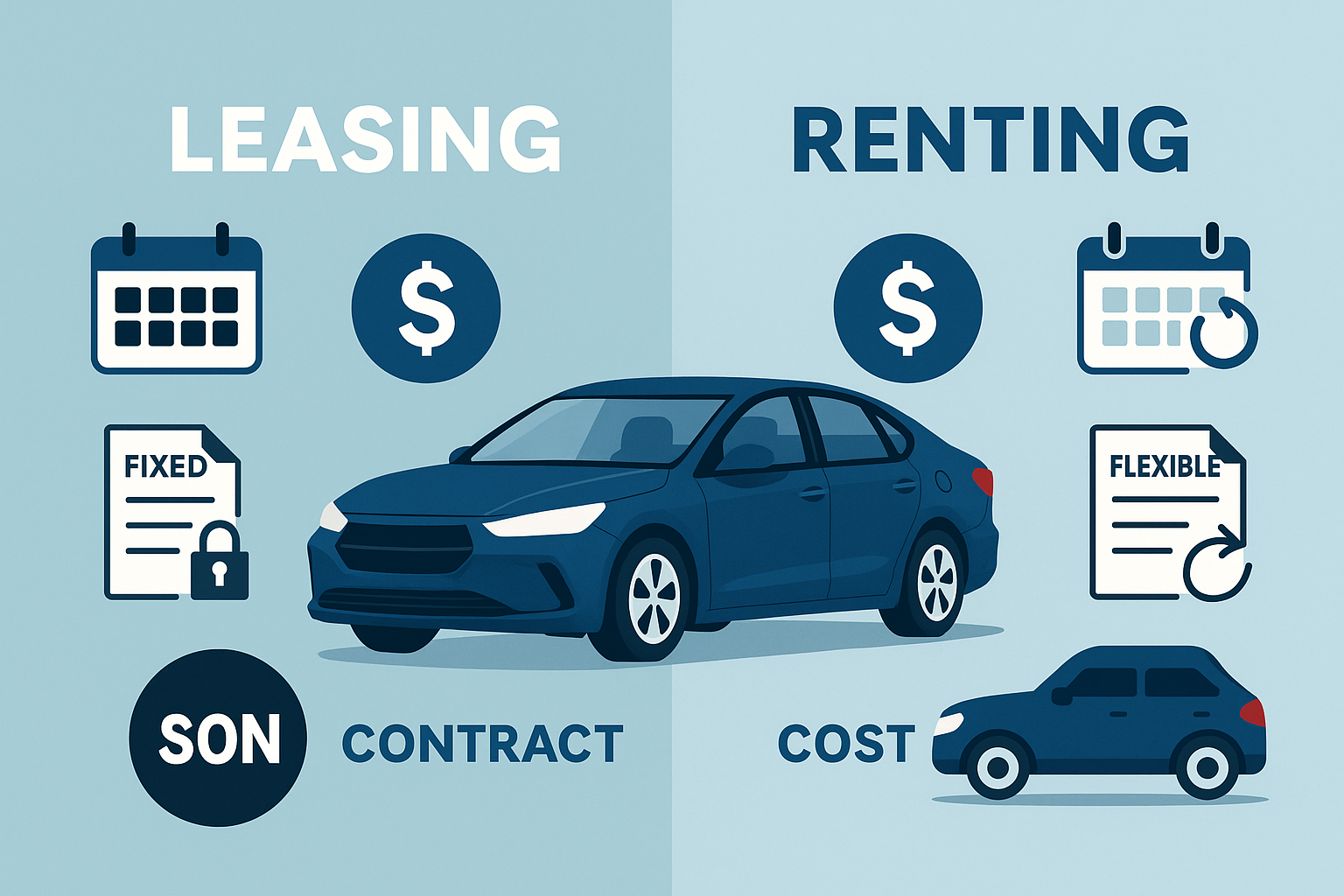If you’re deciding between leasing a car or renting one, monthly cost is likely at the top of your mind. Both options can provide access to reliable transportation without full ownership—but the financial structure, terms, and responsibilities behind leasing vs. renting are very different.
In this guide, we’ll break down how monthly payments work for both choices, what’s included, and how to choose the most cost-effective option based on your usage needs.
Car Leasing: What It Means
Leasing a car is essentially a long-term rental, typically lasting 24 to 36 months, where you pay to drive a new vehicle without owning it. At the end of the lease term, you either return the vehicle or have the option to buy it for its residual value.
Monthly lease payments are usually lower than auto loan payments because you’re only paying for the car’s depreciation, plus interest (called money factor), taxes, and fees.
What’s Included in a Lease Payment:
Depreciation cost over lease term
Interest (money factor)
Sales tax (usually on monthly payment, not full car price)
Acquisition fees and possible down payment
Mileage limits (usually 10k–15k/year, excess charges apply)
Typical Monthly Payment Example:
A new $35,000 vehicle leased for 36 months with a $2,000 down payment might have a monthly payment of $350–$450, depending on credit, mileage, and location.
Car Renting: What It Means
Car rental is a short-term arrangement—daily, weekly, or monthly—typically handled through rental agencies. You’re not committing to ownership or long-term use. It’s ideal for vacations, business trips, temporary transportation, or trying out a car before buying or leasing.
Rental pricing includes more bundled services, which raises the daily or monthly cost.
What’s Included in a Rental Payment:
Daily or monthly rate (based on vehicle type and location)
Insurance and liability coverage (can be optional or bundled)
Local and state taxes and airport surcharges
Unlimited or capped mileage
Maintenance (fully handled by rental company)
Typical Monthly Rental Example:
A standard sedan like a Toyota Camry might cost $1,200–$1,600/month, depending on demand, rental agency, and optional insurance.
Key Differences in Monthly Payment Considerations
| Feature | Leasing | Renting |
|---|---|---|
| Payment Amount | Lower ($300–$500/month typical) | Higher ($1,200–$1,600/month typical) |
| Term Length | 2–3 years | Daily, weekly, or monthly |
| Down Payment | Usually required | Not required (just deposit/hold) |
| Insurance | Must use your own policy | Usually included or sold at counter |
| Mileage Limits | 10,000–15,000/year | Often unlimited (monthly may have limits) |
| Maintenance | Covered for new cars, limited service | Fully included |
| Flexibility | Low—penalties for early exit | High—return anytime |
| Ownership Option | Sometimes (lease buyout) | Never—car is always returned |
When Leasing Makes More Sense
Choose leasing if:
You want a lower monthly cost and new-car reliability
You plan to drive a consistent number of miles per year
You don’t want to worry about long-term maintenance or resale
You’re okay with committing for 2–3 years
When Renting Makes More Sense
Choose renting if:
You need a car short-term (1–3 months or less)
You’re traveling or temporarily without a vehicle
You don’t want to deal with credit checks or long-term contracts
Your usage is occasional or flexible, such as rideshare work or test-driving models
Hidden Costs to Watch For
Leasing:
Excess mileage fees ($0.15–$0.25 per mile)
Wear and tear charges at lease-end
Lease termination fees if you exit early
Upfront taxes or acquisition costs
Renting:
Additional driver fees
Airport pickup surcharges
Insurance add-ons if you don’t opt out
Fuel refill charges if you don’t return full
Cost-Effective Alternatives
If you’re looking at either leasing or renting, consider subscription services like Hyundai Evolve+, Hertz My Car, or Toyota KINTO. These programs bundle insurance, maintenance, and registration into one flat monthly fee, providing short-term lease-like flexibility with higher cost but greater simplicity.
Final Verdict: Monthly Payment Perspective
For long-term affordability and predictable costs: Leasing wins
For flexibility, zero commitment, and fully bundled costs: Renting wins
For very short-term usage or no credit history: Renting is the only option
For people with stable income, moderate mileage, and brand preferences: Leasing offers better value
Understanding how each monthly payment works can help you avoid unexpected expenses and ensure you choose the right option for your driving lifestyle.
